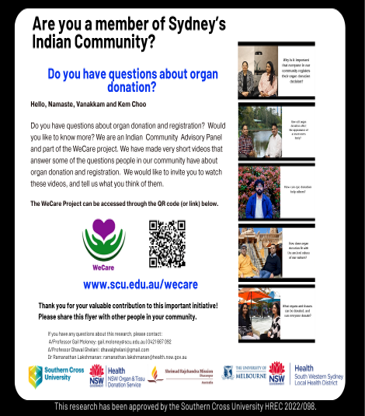Co-created videos and community diffusion: Familiarity and trust in migrant communities and a willingness to know more about organ donation
Ramanathan Lakshmanan1, Gail Moloney2, Michael Sutherland3, Dhaval Ghelani5, Marie Hutchinson2, Maddison Norton2, Iain Walker4.
1Intensive Care Services, Liverpool Hospital, Liverpool, Australia; 2Psychology, Southern Cross University, Coffs Harbour, Australia; 3Organ and Tissue Donation Services, NSW Health, Koghra, Australia; 4Psychology, University of Melbourne, Melbourne, Australia; 5SRMD, Sydney, Australia
WeCARE.
Introduction: Registration rates on the Australian Organ Donation Register in many of Australia’s migrant communities are disproportionately low compared to the national average. Previous initiatives have framed this disparity within a culturally and linguistically diverse (CALD) lens or characterised these communities as difficult to engage, assuming a resistance to organ donation. Our recent co-created survey found registration rates within Sydney’s Indian community were low, primarily due to a lack of understanding about Australia’s organ donation system, highlighting the need for strategies tailored to distinct cultural groups, rather than CALD communities in general. The next phase of our research was a community-led co-creation project that involved producing and evaluating nine short conversational videos addressing questions and concerns about the process of organ and tissue donation in Australia. These videos were designed and produced by an Indian Community Advisory Panel for their community. The aim and focus of this evaluation phase, was to determine whether members of Sydney’s Indian community would, engage with videos about “organ donation and registration”, in a naturalistic, non-experimental setting.
Method: The evaluation phase was conducted on a website specifically designed to host the nine videos. Each video had a thumbnail image of the people in the video, next to a question drawn from our previous research, that was addressed in the video. The Indian Advisory Panel developed a community diffusion strategy, encouraging members to share the link to the videos, through community networks, events, and social media. Participants could watch as many videos as they liked, in the order they preferred. After each video, the viewer was invited to provide feedback about their perceptions, engagement and understanding through a series of Likert-style and open-ended questions.

Results: The website received 1005 visits over five months, with 328 respondents watching at least one video, and 482 videos watched in total across the nine videos. A key finding was the importance of familiarity and trust through either knowing someone in the video or being sent the video by someone they knew, generating further interest in finding out more about organ donation or finding out the answer to the question on the video. All nine videos were viewed positively.
Conclusion: The findings emphasize the vital impact of culturally tailored strategies in encouraging migrant communities to engage with organ donation and registration. Notably, the Indian Community Advisory Panel played a key role in the co-creation and dissemination process, fostering engagement with Australia’s organ donation practices by building familiarity and trust. This highlights the significance of community-led initiatives and reinforces the need to move beyond broad CALD-focused approaches.
Indian Advisory Panel Members; Indian Advisory panel Research Assistants; Maddison Norton; Juliet Howe - Phd fellow; Vicki Harding.
[1] Co-Created Videos
[2] Familiarity and Trust
[3] Migrant Communities
[4] Organ Donation Registration
[5] Community-led initiatives
[6] Culturally tailored strategies
[7] Indian Community Advisory Panel
[8] Community networks
[9] Naturalistic Evaluation